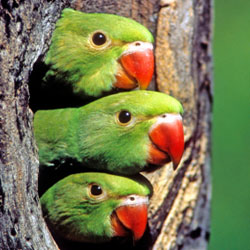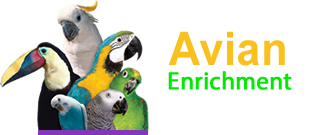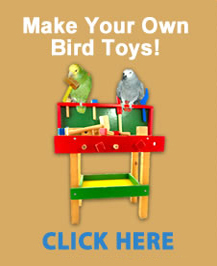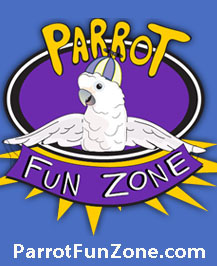A Parrot's Need for Security
 Security is the condition of feeling protected against danger. A lack of security causes stress which can negatively impact your birds health. Stress often leads to undesirable behaviors such as feather picking, screaming and biting.
Security is the condition of feeling protected against danger. A lack of security causes stress which can negatively impact your birds health. Stress often leads to undesirable behaviors such as feather picking, screaming and biting.
It is important to remember that even though we "train" our hand raised parrots to adapt to the human environment, their behavior is still largely influenced by their instinctive tendencies and as such will react to stimuli in their environment based on these instincts.
Parrots are prey animals which means that predators in the wild, such as hawks or snakes, are looking to make them into a meal. Have you ever noticed how frightened parrots get with sudden loud noises or movements from above or behind ? Ever make the mistake of letting a helium balloon float by your bird's cage ? Even the snakelike vacuum cleaner cord/hose can evoke a negative reaction. Our parrots are instinctually hardwired to be on alert for danger 24/7. It is up to us to realize how instinctively vulnerable our birds feel and to help them feel as safe as possible. We can do this by:
- ensuring that the physical arrangement of their environment supports this goal,
- careful observation of our bird's body language so we can note what situations create a fearful reaction,
- avoiding events that threaten your bird, and
- reassuring our birds when they look fearful.
A parrot derives its greatest sense of security from living within a flock. In the wild, activities such as feeding, flying and grooming are performed communally. Since parrots are flock animals, they are also emotionally geared to live as part of a group. Parrots left in isolation without the benefit of direct contact and interaction do not develop a sense of security. Parrots need to interact with their household flock to become comfortable and develop a sense of belonging.
Cage Placement
The decision on where to place your bird's cage is a critical one. Placing at least one side of the cage against a wall may help your bird feel sheltered from predators. Placement opposite the entry to the room allows your bird to observe who is approaching and what is going on. Also, avoid placement in a room with a ceiling fan or directly in front of a window so they can relax and stop worrying about flying predators.
Utilizing cage covers, tents or a perch surrounded by lots of toys can also provide a parrot with opportunities to hideaway and feel more secure when they want to sleep.
Routines
Parrots are less stressed when there are household routines that provide them with the opportunity for regular sleep hours, regular feeding and watering times and special one on one time. Since they have no means to do it for themselves in captivity, parrots are entirely dependent on us to provide them with clean water and a nutritious diet. They need to know they can rely on this.
Interactive rituals also reinforce your parrot's sense of security. For example, greetings in the morning, goodbyes when leaving for the office, game playing when coming home, silly songs during activities such as feeding or bathing all help to reassure your bird.
Change is Good
The earlier in life that you start to expose your bird to changes of a non-threatening nature, the less likely they will be threatened by things commonly encountered in life such as household moves, family additions, time away from their flock (vacations, business trips). Variations in diet and toys, travel, and exposure to new people and places all help to make your bird more flexible and adaptable to change.







Comments powered by CComment